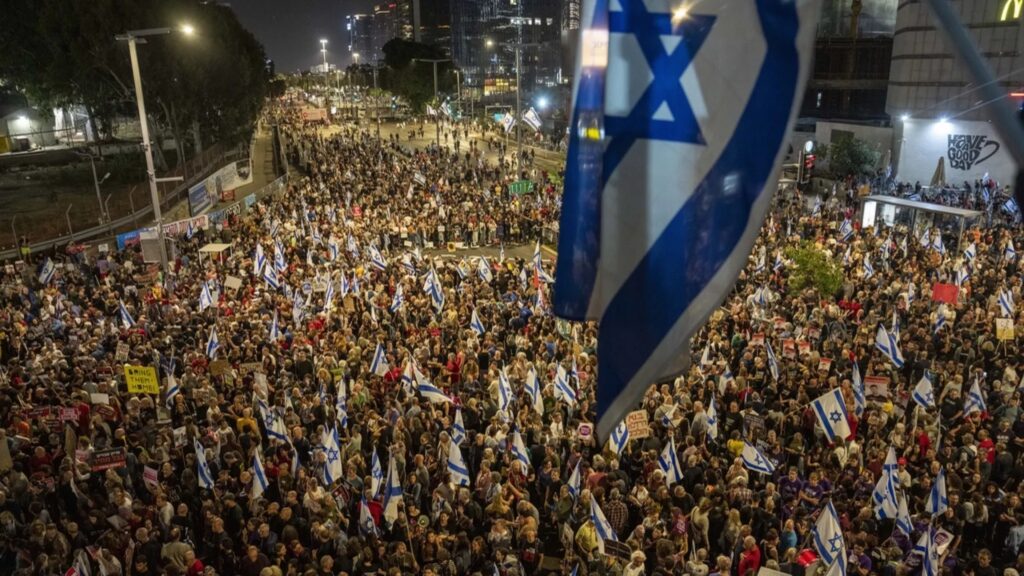After the bodies of six Israeli hostages shot in Gaza were discovered, mass protests erupted in Tel Aviv, Jerusalem, and other locations on September 1. Led by the country’s largest trade union, Histadrut, nearly half a million Israelis took to the streets in a general strike. They shamed Prime Minister Benjamin Netanyahu for failing to protect citizens and demanded an immediate ceasefire. These hostages were a key part of a supposed deal between Hamas and the Israeli government, so it was only a matter of time before protests arose over their violent deaths.
On October 7, Hamas launched “Operation Al-Aqsa Flood” on southern Israel, killing around 1,200 people and capturing approximately 240. However, in November 2023, over 100 of those captives were returned in exchange for Palestinian prisoners. Currently, around 101 hostages remain in Hamas’ possession. Adding to the frustration, the hostage-for-ceasefire negotiations seem to have no clear end. If Israelis were already frustrated with their leadership, it’s showing now.
For Israeli citizens, the demand for a ceasefire is primarily focused on the return of their hostages. The plight of Palestinians continues to be overlooked.
Israelis want their missing brothers and sisters back, and a ceasefire seems to be the only politically viable way to achieve this without prompting further violence. However, not all citizens are calling for a ceasefire. Israel remains a divided country politically, with Netanyahu supporters justifying continued military action, despite accusations of genocide.
A day after these demonstrations began, Netanyahu made a public appearance on a televised news conference, apologizing for failing to bring the captives back alive. Rather than focusing on ceasefire proposals, he emphasized the “heavy price” Hamas would pay for killing the hostages, adding, “Whoever murders hostages doesn’t want a deal.” What he conveniently omitted is that over 200 Palestinians are killed every day in Israeli raids and bombardments. It’s arguable that Hamas has already paid a heavy price. A senior Hamas official denied involvement in the murders, claiming Israeli airstrikes killed the hostages, though the armed wing warned that more prisoners would “go home in coffins” if Israel continued using military force to free them.
With both sides provoked again, it seems highly unlikely that negotiations will resume anytime soon. Netanyahu had already rejected US President Joe Biden’s proposal for a ceasefire in May, so it comes as no surprise that he will use this latest incident to justify continued assaults on Palestine.
For instance, the Philadelphi Corridor remains a significant point of contention between Hamas and the Israeli government. Covering the entirety of Palestine’s border with Egypt, it is a crucial trade route. Even before the hostages were killed, ceasefire talks were stalling as Israel refused to relinquish control of this area. Many Israelis believe the protests will be in vain, as Netanyahu seems determined to stay his course.
However, dissent is growing within the Israeli cabinet. While the National Security and Finance ministers support Netanyahu’s actions, his Defense Minister, Yoav Gallant, has expressed support for the protesters. He went so far as to call the Prime Minister’s obsession with the Philadelphi Corridor a “moral disgrace,” accusing him of prioritizing a strip of land over the lives of Israeli citizens. Yet, this criticism has left the leader unfazed, as he remains focused on exacting revenge.
True to his word, Netanyahu renewed military operations by laying siege to the Palestinian locality of Jenin on September 6. The Jenin camp in the West Bank houses 13,000 refugees, displaced since the 1948 Nakba. While this siege may seem like another instance of regular Israeli military hostility, it is a calculated move on Netanyahu’s part. Refugees in these camps have no legal right to return “home,” and by exploiting these human rights loopholes, Israel continues to escape accountability.
As long as Netanyahu remains steadfast in his pursuit of military aggression, protests—no matter how large—are likely to be futile. Israelis want a ceasefire for their own sake, but their leader will go to any lengths to avoid one.
The protests have given him the perfect excuse to rationalize new attacks on Palestinians, whom he blames for the deaths of the hostages. Israeli civilians are left with little recourse but to watch, as these actions are framed as “self-defense.” Furthermore, this incident is likely to erode any remaining public sympathy for Palestinians, as they are increasingly viewed as the enemy. What’s most likely to follow is another period of fatal military occupation, but for Palestinians, this is nothing new.

